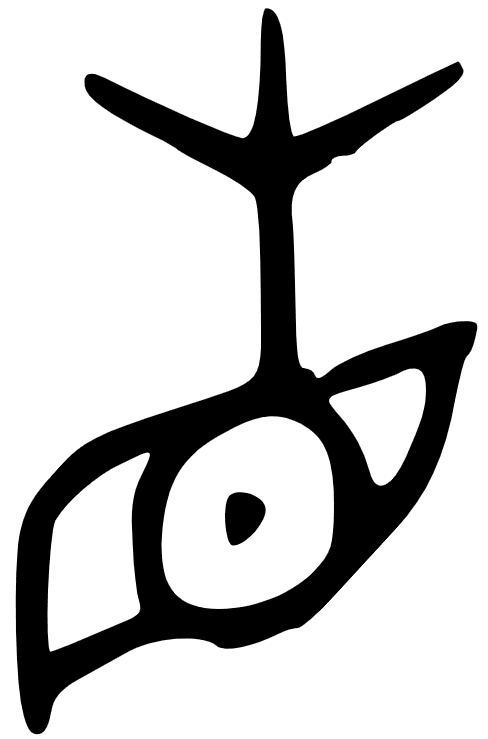Following on from a previous post…
Hexagram 20, Seeing
Hexagram 20 has xun, wind and wood, over earth; its Oracle text suggests earth’s open, available quality:
‘Seeing. Washing hands, and not making the offering.
There is truth and confidence like a presence.’
Earth will not act, but allows: the ritual provides space for truth to arise, like the earth provides space for seeds to germinate. If you’re from a Christian culture, these trigrams might remind you of Pentecost, when the Holy Spirit (spiritus – breath, wind) came first as a strong wind.
The Image as ever, gives a quietly practical perspective:
‘Wind moves over the earth. Seeing.
The ancient kings studied the regions,
Saw the people,
And established their teachings.’
The ancient kings studied and saw, with earth-like qualities, and established teachings that would carry culture as far as the wind.
The character she 設, ‘established’, is formed of a mouth speaking and hand acting, and naturally speech belongs with xun, wind. ‘Studied’ is sheng 省, meaning to inspect, examine or watch over, including in a ritual inspection of mores. The character originally shows an eye with a sprouting plant appearing to grow from it:
The Pleco dictionary suggests an original meaning for sheng of a crop inspection, something very relatable for me at the moment (are those aphids on that pepper plant?). But it seems the character was always drawn with the plant growing from the eye, as if from the earth, and wait, don’t we know some trigrams about that?
The teachings grow from Seeing like the plant grows from the earth. Outer xun, with its open yin line at the base, joins with earth, is open to it, and emerges from it. The kings, embodying the two trigrams, both respond to conditions and ultimately create them.
Hexagram 23, Stripping Away
With mountain above earth, we’re only a single line away from Hexagram 2. But whereas in its Oracle, ‘the noble one has somewhere to go,’ in a time of Stripping Away, it’s ‘fruitless to have somewhere to go.’ When things are ending, falling away – or being taken away – there’s little point in thinking of where else you’d like to get to. Stand on the plain, look up and see the mountain in your way: you are here.
(When 23.6 changes and the mountain becomes earth, ‘the noble one gets a cart’ and he’s back on the road.)
You can imagine – and I think the Image authors did imagine – the mountain eroding into the earth below. Although we analyse hexagrams into two groups of three lines, they don’t all look like that at first glance:
Hexagram 23 looks like a group of five contiguous broken lines, with a single solid line above: the mountain’s yin lines look like an extension – or a deepening – of inner earth. And sure enough…
‘Mountain rests on the earth. Stripping Away.
The heights are generous, and there are tranquil homes below.’
…there is generosity above, just as ‘generous de‘ is a quality of earth –
‘Power of the land: Earth.
A noble one, with generous de, carries all the beings.’
It’s the same word in the Chinese, 厚 hou, meaning deep and thick as well as generous, and it occurs only in these two hexagrams, the ones with the deepest soil.
The ‘tranquil homes’ are another echo of Hexagram 2, this time from its Oracle, which ends – after all its travels – with ‘tranquil constancy, good fortune.’ An 安, tranquil, is one of my favourite Chinese characters:
It shows a woman at home, under her roof – and its shape reminds me irresistibly of 23’s component trigrams, with outer mountain in its role as protector, securing the space – not against loss, but through it.
Hexagram 35, Advancing
‘Advancing, Prince Kang used a gift of horses to breed a multitude.
In the course of a day, he mated them three times.’
The ‘course of a day’ is found in Advancing’s component trigrams: the sun over the earth. Bradford Hatcher saw this as the earth energised by the sun, and given order:
‘More than light is dawning here. This energy coming into the system not only powers the system: it will organize it too, in the same way that good health will clarify the mind.’
So if the sunlight is powering and organising, what’s the role of earth? It provides the sun with something to shine on – something that can respond and be brought to life.
That responsiveness is Prince Kang’s: he is ready to commit his energy to breeding the horses, multiplying his gifts. And, of course, it’s found in the fertility of the mares, who are the multiplier in all this! (This is horses’ second appearance in an Oracle text.) It seems to me to be the same earth-readiness, supporting the outer trigram so its potential can be realised, that you find in hexagrams 8 and 16 (and 45).
Then the Image…
‘Light comes forth over the earth. Advancing
The noble one’s own light shines in her de.’
…makes clear something we might have missed from the Oracle: that this is not just about the happy chance of a blessing falling from above.
The lucky break has to be part of its meaning: Kang’s counterpart in Hexagram 36, Prince Ji, was surely just as willing and virtuous as he was, but could do nothing but hide his light. But the hexagram is not just about being lucky. The light comes forth from the earth, with the same verb that was applied to the thunder of Hexagram 16: chu 出, to come out from, emerge from. This is the noble one’s own light: it comes from inside, sustained by their own energy.
Hexagram 45, Gathering
‘Gathering, creating success.
With the king’s presence, there is a temple.
Fruitful to see great people, creating success.
Constancy bears fruit.
Using great sacrificial animals: good fortune.
Fruitful to have a direction to go.’
This might be the fullest expression of earth’s willingness to support. Prince Kang lent his energy to horse-breeding; in Hexagram 45, the king, the great people and an offering of the biggest and best animals all support the Gathering. We can picture all the people congregating at the temple with shared purpose.
The trigram picture here is lake above the earth – a reservoir contained by high earth banks. The Image sees the risk this represents:
‘Lake higher than the earth. Gathering.
A noble one puts weaponry in good order
And warns against the unexpected.’
From the earliest commentaries, people have recognised that the noble one is warning against the risk of flooding. Gathering all your water in one reservoir has its advantages but also its dangers – all the more so if ordinary people live in pit dwellings.
The role of earth in this picture is clear enough: it contains the water, creates the reservoir, and protects against flooding. It quite literally ‘provides the how’ – the building material for the banks.
Why does the noble one prepare weapons, though? (This is assuredly what she does: the character for ‘warning’ or ‘guarding against’ is the same as in 62.4, and originally showed two hands grasping a weapon.) Wang Bi implied that she was guarding against an emergency when societal consensus might dissolve into an ‘every man for himself’ mindset.
I tend to think of the depth of water in the lake as a deep emotional investment that can easily run out of control. It doesn’t take much for the banks to breach – that’s why the police prepare for big football matches. And breaches happen in the individual psyche, too, when we give something all we have. Earth qualities here might mean an openness and readiness to respond to outcomes that aren’t what we had in mind.












Thank you Hilary for long awaited and thoughts-triggering post!
I was playing with hexagrams from your “Earth Inside” posts #1 and #2 combining them together and some interesting insights caught my curiosity.
1. Do you have any plans and time to continue your “Earth Inside” line of posts? There are more –
at least 7 more hexagrams ## 11, 24, 7, 15, 46, 36, 19 – which have trigram “Earth” as a building block. Your insights here would help us to get a more advanced picture for Earth Trigram and related to it hexagrams.
2. You have arranged 8 hexagrams by their hexagram numbers and that is perfectly logical.
I am curious though – would there be any advantages of arranging them according to “Early (or Late) Heaven Sequence Chars” for Trigrams? Would that arrangements carry any additional, previously hidden insights? For example, can a progression trajectory of mentioned 8 hexagrams based on their specific arrangement shed some additional light? That would be great to know.
3. The question I am discussing in this section of my comments is not directly related to your two post and is of experimental character. So, feel free to skip it if not interested.
There is potentially one more, unexpected venue in mapping hexagrams to the real world. It is neither a standard nor a discussed-and-approved approach, which I believe was not discussed (correct me if I am wrong) in I Ching community so far. It is what I call “I Ching and Food Diets”.
It stems from so-called Macrobiotic Diet originated in Japan and popularized in the West in the mid-20th century by George Ohsawa. Macrobiotic Diet thinks of food in terms of Yin-Yang balance (for more details see, for example: https://www.foodgalaxies.com/MiscellaneousDiets).
Mr. Oshawa considers the Yin-Yang balance for the whole dish. But we can go one step deeper and try to map dishes to I Ching Trigrams or even to Hexagrams.
With that approach, a glass of orange juice (sweet taste, yellow color) is “Earth-over-Earth” dish that maps to Hexagram #2 discussed in your post #1.
Green Tea with Cream on top of it can be interpreted in terms of Trigrams as Mountain (sweet taste, white color) over Wind (dark green color, sour taste) which maps to hexagram #18 – Corruption, Correcting Deficiencies.
Similarly, all multi-layered torts / cakes and most American burgers / sandwiched can be mapped directly to their corresponding hexagrams layer-by-layer, line-by-line. And any dish with 6 main ingredients potentially can have a corresponding hexagram in I Ching world. I believe that is promising “discovery” that could lead to more integrated view of things around us.
With that said, I invite everyone who considers this experimental approach to be interesting and deserving attention to share their thought, suggestions and critique to help us to develop it to the more mature framework.
Looking forward for your new post Hillary!
Hi Aidyn!
Well, that would be an Earth Outside post. I’m sure I’ll get to it eventually – I’d like to do all the sets of 8 trigrams.
That doesn’t grab me as a research topic – over to you? 😉 I didn’t go looking for a progression through the Sequence, either. I think there was one, towards more complex / sophisticated kinds of earth-availability, but perhaps only an echo of the progression of the Sequence as a whole.
Your food trigrams/ hexagram recipes strike me as exactly the kind of thing that people could have fun with in the Exploring Divination forum. Would you like to post it there?